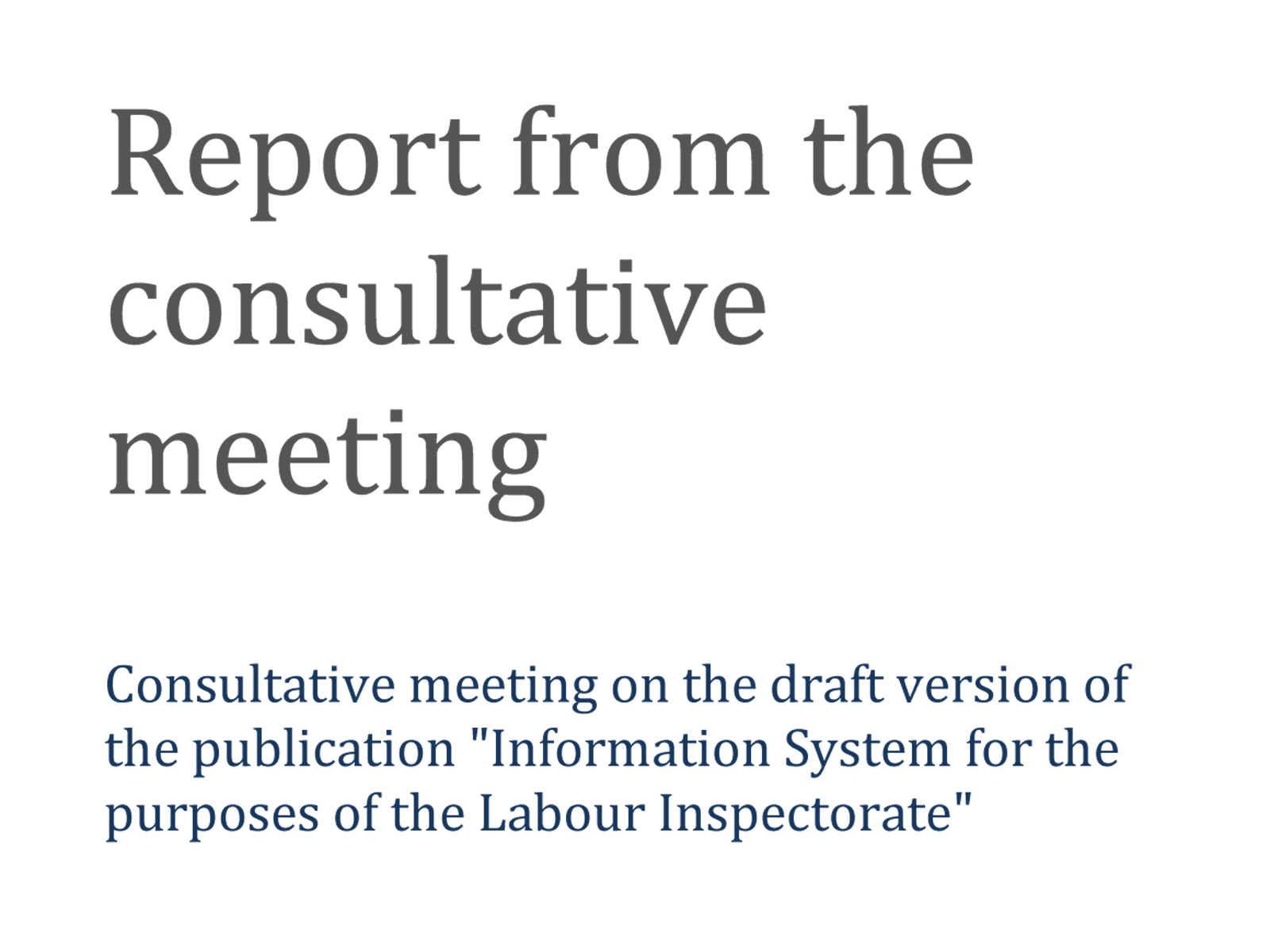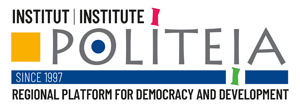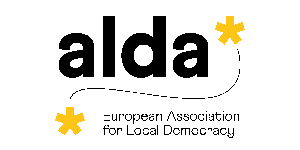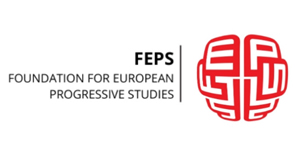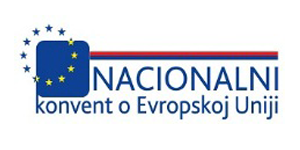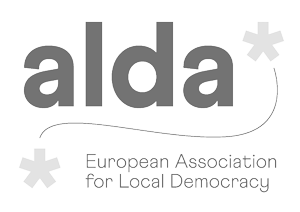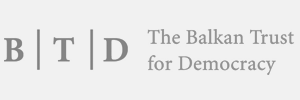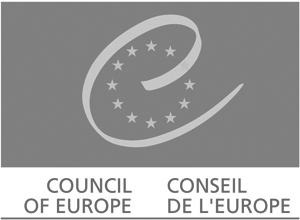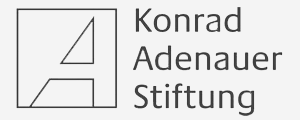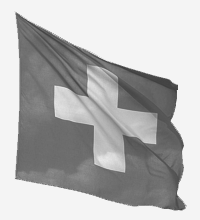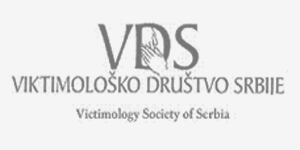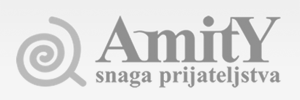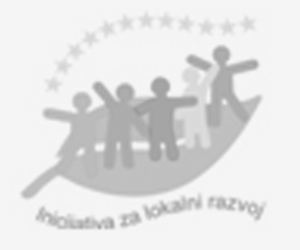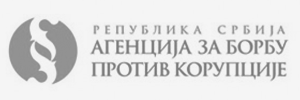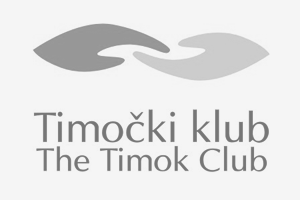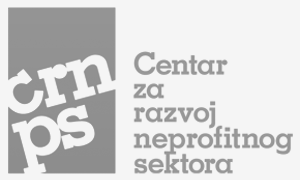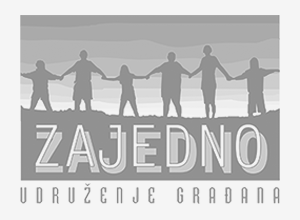Report from the consultative meeting on the draft version of the publication "Information System for the purposes of the Labour Inspectorate"
Consultative meeting on the draft version of the publication "Information System for the purposes of the Labour Inspectorate"
The goal of the meeting:
At the consultative meeting we presented a draft version of the publication "Information System for the purposes of the Labour Inspectorate", which was created within the project "Reducing undeclared labour through networking of institutions and more transparent work of the Labour Inspection". The publication consists of three parts. In the first part of the publication, written by Milos Savic, an expert in information technology, a possible mode of operation of the Information System for the purposes of the Labour Inspectorate (ISIR) was presented through representative examples of IT-related business practices, without the intention to influence the definition of business processes. The second part presents the benefits of establishing an information system for the purposes of the Labour Inspectorate. The authors of the second part are Professor Ksenija Petovar and Milena Vujovic. The third part of the publication contains proposals for amendments to the regulations necessary for the establishment of ISIR, which was written by Natasa Nikolic.
The conclusions of the consultative meeting will be included in the final version of the publication.
About:
The project "Reducing undeclared labour through networking of institutions and more transparent work of the Labour Inspection" is part of the three-year activities of the Foundation "Center for Democracy", aimed at combating informal employment and informal economy and supported by Solidar Suisse - Office in Serbia within the program “Decent work”. Center for Democracy organized numerous consultative meetings in 2013 which were attended by representatives of state institutions, business, trade unions, NGOs and the academic community. The meetings focused on the informal economy and informal employment, with the aim of finding common solutions for its suppression. As a result of these meetings, the publication "Decent work and the informal economy" which presents recommendations for combating informal labour and informal economy was created. Some of these recommendations were adopted and implemented in changes and amendments to the Labour Law.
In 2014, as a result of analysis and surveys for labour inspectors and consultation with representatives of the Labour Inspectorate, the ILO, trade unions, the Union of Employers of Serbia, NGOs and representatives of the academic community, a policy paper "Serbia without illegal work - enhancing the role of Labour Inspection in preventing undeclared employment" was created together with the following publication "More effective role of labour inspection in combating undeclared employment". The recommendations for improving the role of Labour Inspection in combating informal employment were given in the proposal of the practical policy, including the establishment of an information system and launching of a separate website of the Labour Inspectorate, of which the second has been realized - the Labour Inspectorate launched a sub-site within the website of Ministry of Labor, Employment, Veterans and Social Issues in April 2015. Through the project "Reducing undeclared labour through networking of institutions and more transparent work of the Labour Inspection" a step forward was made in the draft version of the publication "Information System for the purposes of the Labour Inspectorate". We presented a possible way of operating ISIR, the benefits of its establishment and the necessary changes in regulations. So far, the establishment of the information system for Labour Inspectorates has been supported by: the Union of Employers of Serbia, UGS Independence, Modern Skills Center, Association for Health and Safety at Work Serbia, Center for Dignity of Labour, Accessibility Audit Association, Foundation Dokukino, Timok Club, Association Forum for Civil Action – FORCA, Association of Citizens Together, Majdanpek Resource Center, the Center for Human Rights Niš, Protecta, ENECA (Economic Expert Community Association) in Nis, entrepreneurs Association Artesa , Women's Initiative of Vojvodina - Zivo, Osvit - Roma Women Association, a subsidiary of National employment service in Nis and others.
The place and time of the meeting:
The consultative meeting was held on Thursday September 24th 2015 in Belgrade, at the Palace Hotel.
Host: Foundation "Center for Democracy"
Foundation "Center for Democracy" was founded in 1994 by a group of prominent intellectuals.
Over the last nine years of its work, the Center for Democracy pays special attention to economic, social and cultural rights and advocates dignity of labour in Serbia, through following projects : "The return of women to the labour market", "The power of Social Responsibility – The state, business and the public together in the protection of economic and social rights", “Women, employment VS poverty", "Easier and faster way to employment", "The Power of Social Responsibility – For change of legal framework and the improvement of human rights of employees", "We all have a right to a safe workplace", "Decent Work Balkan Network", "Decent Work for All", "Equal at work", "Towards More Efficient Prevention of Undeclared Work and Shadow Economy ", "Stop corruption that threatens decent work", " More effective role of the public and civil society in monitoring and protecting workers’ rights" , "More effective role of labour inspection in combating undeclared employment", "Citizens for inspection reform" and so on. On behalf of the Center for Democracy, the meeting was attended by Ksenija Petovar, program director and co-author of the publication "Information System for the purposes of the Labour Inspectorate", Natasa Vuckovic, Secretary General, Bojana Ruzic, program coordinator and Milena Vujovic, coordinator of the project "Reducing Undeclared Work Through Networking of Institutions and More Transparent Work of Labor Inspection" and co-author of the publication.
Participants:
The meeting was attended by:
▪ Maja Ilić, Labour Inspectorate
▪ Rade Dragović, E-Government Directorate
▪ Jugoslav Stojiljković, E-Government Directorate
▪ Vesna Ristić, Market Inspection
▪ Branislav Dobrosavljević, the Agency for Business Registers
▪ Zoran Martinovic, Director of National Employment Servise
▪ Dragan Radovic, member of Association of Employers of Serbia
▪ Milan Stefanovic, USAID BEP project
▪ Ivan Dragosan, USAID BEP project
▪ Sasa Jelic, USAID BEP project
▪ Jovana Stefanovic, USAID BEP project
▪ Sasa Dimitrijevic, President of the Trade Union of construction, construction materials industry, the timber industry and the travel industry "Independence"
▪ Sanja Paunovic, the Union of Autonomous Trade Unions of Serbia
▪ Zora Veselinovic, the Federation of Independent Trade Unions of Novi Sad and municipalities
▪ Jovan Protic, National coordinator of the ILO in Serbia
▪ Lidija Kuzmanov, Team for Social Inclusion and Poverty Reduction
▪ Ivana Vlaovic, the Misdemeanor Court in Belgrade
▪ Milojka Zarubica, the Agency for Safety and Health at Work
▪ Snezana Milicic, Association of Citizens Together together
Moderator:
The meeting was moderated by Bojana Ruzic.
Presentation of the draft version of the publication "Information System for the purposes of the Labour Inspectorate"
At the beginning of the meeting, Mrs. Milena Vujovic presented the project "Reducing Undeclared Work Through Networking of Institutions and More Transparent Work of Labor Inspection", which encompassed the publication "Information System for the purposes of the Labour Inspectorate", after which she presented the information system itself. She presented the purpose of the system, the preconditions for its establishment, users and functioning of ISIR, as well as functions and capabilities provided by the information system, such as notifications, subsystem for search, database, checklists, data segmentation, risk analysis, future planning activities – creation of a list of companies for surveillance, templates and automated document creation, analytics and reporting.
Mrs. Ksenija Petovar spoke about the benefits of the information system and pointed out that the labour inspectors who participated in the poll, which was conducted by the Center for Democracy in 2014, indicated that the biggest problem in the technical equipment of the Labour Inspectorate is insufficiently connected and available data, and lack of a unique and accessible database, or information system.
Discussion on the draft version of the publication
After the introductory part , the participants joined the discussion. The discussion was attended by Maja Ilic (Labour Inspectorate), Rade Dragovic (E-Government Directorate), Ivan Dragosan and Milan Stefanovic (USAID BEP), Dragan Radovic (Union of Employers of Serbia), Vesna Ristic (Market Inspection), Zoran Martinovic (National Employment Service), Branislav Dobrosavljević (Business Registers Agency) and Jovan Protic (International Labour Organisation).
At the beginning of her presentation, Mrs. Maja Ilic (Labour Inspectorate) highlighted the fact that the Labour Inspectorate doesn’t have an information system, and gave her support to the Center for Democracy which advocates its establishment. She added that the Labour Inspectorate expressed the need for such a system for the past ten years, but they were never granted adequate budget funds for its launch. The representative of the Labour Inspectorate identified a lack of technical equipment in the Labour Inspectorate offices. She said that normally, each inspector should be equipped with a laptop, but the reality is such that, for example, in Vranje, Prokuplje and some other towns in Serbia, there are no more than one or two computers in the offices. Afterwards, she indicated that it is good that Center for Democracy advocates the importance of information systems. She also stated that at present, the Labour Inspectorate is in agreement with the Central Registry of Compulsory Social Insurance and that its inspectors have gained access to certain information that is also available to this institution, which as a result, greatly facilitates their work. She added that she believes that the Labour Inspectorate would benefit greatly if given access to databases of all other relevant institutions. Mrs. Ilic indicated that publication should contain provisions of the Law on Inspection Oversight relating to the surveillance of non-registered entities. She added that terminology which is characteristic of the development of information systems should be aligned with the terminology commonly used by inspectors.
Mr. Rade Dragovic (E-Government Directorate) spoke about the role of the Directorate in the reform of the inspection, the project of establishing a unified information system through which all inspections and current trends in this field will be linked. Dragovic also drew attention to the fact that Coordination Commission for inspection already exists, and that its operations can be viewed on the website www.inspektor.gov.rs. Its members are Commissioners, Deputy Prime Ministers, and ministers and heads of individual inspections. He also added that publication should be completed in accordance with the provisions of the Law on Inspection Oversight. A representative of E-Government Directorate spoke about the study visit to Republika Srpska and their established General Inspectorate which unified all inspections. He added that, during the visits to Republika Srpska, they had the wholehearted support of USAID BEP project in the preparation for the Law on Inspection Oversight. According to him, E-Government Directorate announced a tender for a group of experts to carry out an analysis of business processes in all inspections and to create documents that will be the basis for the next phase (by March or April 2017), which is the implementation of the information system in all inspections. Mr. Dragovic added that E-Government Directorate has planned funds for equipment of inspectors and that the Government has set the establishment of information systems as a strategic goal, as it is guaranteed by the Law on Inspection Oversight and the establishment of the Coordination Commission. In his opinion, the independent analysis provided by Center for Democracy – “Information system for Labour Inspectorates” will be very usefull, especially in terms of analysis of benefits from such a system, which the E-Government Directorate did not perceive in that way and stressed that the activities of the E-Government Directorate lack visibility.
Mr. Ivan Dragošan (USAID BEP project) spoke about the establishment of a unified information system through which all inspections will be connected. He said that coordination and efficiency of inspection bodies remains one of the main objectives. According to him, one of the key assumptions is that coordination will exist with external systems (other institutions). In other words, the project does not exclude existing information systems of other institutions and it can be linked with the platform (database) of other inspections. Mr. Dragosan pointed out that the application of information technology became an integral part of labour procedures. He added that a unified inspection information system remains one of the key factors for successful implementation of all the provisions of the Law on Inspection Oversight. Mr. Dragošan indicated that, the importance of this information system is recognized by the Directorate of e-Government, the Ministry of Public Administration and Local Self-Government, and the Government itself, and the budgetary funds for its establishment have been provided. At the end, Mr. Dragosan reiterated that a common platform will be established which will include the work of all inspections, and that all business processes related to the work of inspections will be identified. He said that each inspection is quite specific in their work and recommended development of specific segments for individual inspections, in accordance with the Law on Inspection Oversight.
Mr. Milan Stefanovic (USAID BEP project) presented in more detail unified information system through which inspections will be linked. According to him, it is a common platform which will include information, data and applications of general importance for all inspections, and that throughout system of subsystems the inspections will be connected to this common platform. Mr. Stefanovic gave the example of the Market Inspection, which already has an established information system that is currently being adapted and will be a part of the future unified information system and which resembles an information system for the Labour Inspectorate, presented in a publication of the Center for Democracy. Taking this into account, he added that it is necessary to adapt and update the publication in accordance with the Law on Inspection Oversight. He also pointed out the shortcomings of General Inspectorate of Republika Srpska, saying that situation in Serbia is slightly better and stressed that inspections should remain within the ministries and other bodies and that they should coordinate their work, both individually and through the Coordination Comission. Mr. Stefanovic does not consider it necessary to adopt a special law on labour inspection and that the specificity of labor inspection should be further expressed in the Labour Law. He added that there are divided opinions among inspectors on the inspection reform and establishment of the information system, but believes its establishment would put a stop to poor performance of services, and corruption and that it would ensure transparency. Mr. Stefanovic gave examples of repeat surveillance in companies that operate correctly and indicated that there are inspectors who had 120 open cases, none of which were closed and reiterated that the information system would ensure transparency and enable risk assessment, ie. calculation algorithm assessing the degree of risk. According to him, the transparency will ensure prevention of corruption, malpractice and increase professionalism, responsibility and so on. He finally added that under Article 48 of the Law on Inspection Oversight inspector must use a unified information system, but that all depends on the director of inspections, which will be coordinated through the Coordination Committee, Ministry of State Administration and Local Self-Government and other participants who provide support.
Mr. Dragan Radovic (Union of Employers of Serbia) started his speech by asking whether the introduction of an information system for the needs of the Labor Inspectorate meant moving one hundred thousand workers employed on the black market into the legal system, which would annually increase budget revenues by 120 million euros (if we take into account the contributions on the minimum wage, which amounts to 100 euros), or if the actual number is two hundred thousand workers annually and added that the question should be directed to Labour Inspectorate and the Tax Administration. He then cited data from 2013 when it was discovered that there are only 5500 illegally employed workers. He also pointed out the assessment of about two hundred thousand workers who officially receive minimum wages but but allegedly receive a different amount when being paid in cash and asked why Labour Inspectorate doesn’t exercise control. According to him, the main causes of undeclared work is "disastrous work of the Tax Administration and the Labour Inspectorate" and high taxes and contributions. Mr. Radovic added that he does not think that taxes and contributions are too high for the lowest paid wage and believes that reducing undeclared work does not have to follow the creation of new jobs, but rather that “the jobs already exist, but the workers should be shifted from undeclared labour into registered labour”. He added that undeclared labour needs to be suppressed in businesses that have tens, even hundreds of undeclared workers, and that small companies which otherwise can’t survive should be left alone and dealt with at the end. He also mentioned the abuse of student and youth organizations. Based on his experience in dealing with the subject of gray economy, he expressed the view that companies who operate in gray economy quickly deteriorate and that Tax Administration, the Labour Inspectorate and the Market Inspectorate are supposed to save them from collapse. As a conclusion, he pointed out that the proposal for the establishment of an information system is good and that it should be applied, and he believes Inspectorate needs ISIR since it provides good solutions.
Mrs. Vesna Ristic (Market Inspection) said that the Market Inspectorate has its own information system since 2010 and that it helped the work of Inspectorate, but it also exposed some weaknesses. The Market Inspectorate is currently developing a better information system, which will be operational from October 1st this year. Mrs. Ristic said that training of inspectors, the head of the management of the Ministry and market inspection is in progress and that information system will operate in phases. According to her, the development of the information system of the Market Inspectorate also started by analyzing the business process, in the same way as it was done in the publication "Information System for the purposes of the Labour Inspectorate”, and she agrees that it should be done by an independent organization, because according to her, the opinions in ministries and inspectorates tend to be subjective. She added that she believes that the Center for Democracy reached the level of functional specifications and that the information system should be enforced. Mrs. Ristic explained the way the information system of the Market Inspection operates in detail, adding that it largely coincides with the functioning ISIR. She believes that it should be continued with introduction of information systems and further connections with other institutions which is necessary and important. She added that it is important to establish connections with the Tax Administration, Ministry of Interior, Agency for Business Registers, etc. As she stated, the Market Inspectorate has taken steps in connecting to with the Agency for Business Registers. In her opinion, networking with other institutions will enable inspectors to be more efficient, facilitate their work and enable them to be unified. It will also contribute to transparency and prevent inspectors from inspecting just one particular subject time and time again, while at the same time, some subjects are never really being inspected. Some subjects are inspected for 10 different regulations, others for just one. According to her, the information system will significantly facilitate supervisions and allow inspectors to perform risk analysis. Mainly, it will allow them to easily obtain information about when and where supervision was carried out several times, and where it was never executed. She added that a company where the population is dense (eg Mercator in New Belgrade) shouldn’t be treated the same way as, for example, the family shop in a village. Mr. Ristic has confirmed the observed deficiencies related to the General Inspectorate of Republika Srpska, and added that inspectors in the Market Inspection of Republika Srpska showed a great resistance to introduction of the information system. However, after its introduction, and after they learned of its advantages, they refused to work without it since it greatly facilitates their performance. At the end she once again explained how the information system works - if the inspector went to supervision with a lap top and entered basic data, the system would automatically show the records, which further show if there are any violations, offer the possibility to issue a decision, etc. According to her, everything in the system is connected - commitments, administrative measures and punitive measures, and in addition the information system provides a database and thus further facilitates the work of inspectors, as it allows the inspectors to see solutions of their colleagues if they come across a problem they haven’t previously encountered.
Mr. Zoran Martinovic, Director of the National Employment Service and former Secretary of State in the Ministry of Labor, Employment, Veterans and Social Issues said that in the previous period, efforts were made to improve the Labour Inspectorate, but they showed little results. Mr. Martinovic expressed his disappointment that nothing has changed over the last year and that employees in the Labor Inspectorate still face difficulties at work, and that they have, in his opinion, the lowest level of working conditions compared to other inspectorates in Serbia. Director of the National Employment Service said that it remains to be seen if the adoption of the new Law on Inspection Oversight will have significance and added that "people will still remain in their yards (areas) and make do as best they can", and that, in his opinion, a lot of time will pass until we fully accept joint inspection. Mr. Martinovic said that, as a representative of the National Employment Service, he has increased interest to see more efficient control of undeclared labour, therefore this will then lead to better indicators of the labour market. He added that the National Employment Service has an information system that provides a variety of options and enables employment data to be published on a monthly basis. He said that they have good databases, but they have nevertheless entered into the process of securing, funding and planning reengineering of the information system. Mr. Martinovic asked the question – what needs to happen so that Labour Inspection can finally establish an information system, bearing in mind the public procurement procedures. He also added that system needs to be compatible with the information system of Ministry of Labour, Employment, Veterans and Social Issues.
Mrs. Ksenija Petovar pointed to the possibility of serious resistance by the people who benefit from such disorganized system, adding that we’re dealing with this situation for decades, and that any attempt to regulate is in fact faced with resistance from some invisible interest groups. According to her, there are different interest groups that are linked with the ruling elite, undercover holders of power and with those who “operate in darkness, from the shadows”, etc. Mrs. Petovar confirmed that the establishment of such a system undoubtedly contributes to the public interest, strengthens the rule of law and that the benefits are impossible to deny. According to her, if more participants join together and if we succeed in setting an agenda for this topic, and introduce it to the public, the more we reduce the room for resistance of those who are against it. Mrs. Petovar stated that according to the theory of power, power grants the ability to impose its will in the decision-making process, and it can be used in a way that disables certain topics from reaching public discourse, and added that it was very important for this topic to reach public discourse, and make people realize that this is something that needs to be done in order to regulate many problems, not only concerning Labor Inspections, but generally - the organization of society. Mrs. Petovar emphasized the importance of unifying and shared a set of ideas of Alexis de Tocqueville, that we should develop the art of unifying and collective work, and added that it is important to unite all those who are interested in this topic and make it public.
Mr. Branislav Dobrosavljević (Business Registers Agency) welcomed the organization of a consultative meeting with all the participants. He agreed with Mrs. Ksenija Petovar and added that the Business Registers Agency presents a living example, that confirmes her allegations. According to him, the creation of the Business Registers Agency and its opening in 2005 interrupted a channel of corruption measured in millions of euros, referring to corruption during the registration of various businesses in the Commercial Courts. Dobrosavljevic said it was necessary to “put on pressure and involve the public”, and cited the example of the opening of the Business Registers Agency in the presence of ambassadors, regional director of the World Bank and USAID and the ministers, which resulted in disruption of the largest and most dangerous resistance attempts. He supported the efforts of the Center for Democracy and organization of the meeting and pointed out that it is a first-class topic. Mr. Dobrosavljevic participated in the development of the General Inspectorate of Republika Srpska and according to him, the World Bank assessed the General Inspectorate and Business Registers Agency as institutions of renown. He agreed with the opinions of other participants and stressed that the inspectorate should retain the independence in the ministries, but showed a great objection to the idea of inspection coordination or the establishment of the Coordination Commission and its members. According to him, all theories of systems management say that the systems can’t be managed through coordination. Mr. Dobrosavljevic also believes that it is essential to assign a person that would answer to the Prime Minister for the successful implementation of the project of establishing a unified information system for inspection, otherwise it would be take at least three more years to get something meaningful done. Regarding the work of the Business Registers Agency, since the beginning, the the Agency is computer-oriented and has excellent cooperation with all the institutions. He drew attention to the Registry of measures and incentives for regional development on the website of BRA, through which the collaboration of 16 or 17 institutions has been established, of which the most important one is National Employment Service. According to him, in the Register of measures and incentives for regional development, the data is linked to the registers of all involved institutions and the Institute of Statistics and that it represents a significant source of data. Mr. Dobrosavljević drew attention to the fact that developed countries have their own information systems, which have different names and different management methods and that it is necessary to establish "information system of the state of Serbia". He added that for ten years there has been a tendency to establish a Ministry of Information Society, which was abolished after 3 years, and merged with the Ministry of Science and other ministries, adding that there are serious objections to the discrepancy that exists between addressing issues of the Information Society at the Ministry of Trade, Tourism and Telecommunications and the Ministry of State Administration and Local Self-Government and in the Ministry of Labour, Employment, Veterans and Social Issues. He talked about specific inspection systems that need to fit into this unified system, and except the Register of Business Entities, none of the state registers is ready for interoperability and that at the current level of technology, interoperability is very easy to achieve, since there are web services that have perfect methods for exchanging information, which by their nature isolate the information systems so that each can work independently. In other words, there are no technical obstacles to the coordination of individual inspectorates and their information systems, but there is a problem at the legal level, the organization and provision of appropriate conditions to individual inspectorates. Mr. Dobrosavljevic added that he expects the E-Government Directorate to support the project and provide adequate resources and safety equipment. According to him, the Agency for Business Registers, through two donations, received the complete equipment, hardware and software, and all that was needed for the first three months of operation, including staff salaries. Mr. Dobrosavljevic concluded that he largely supports the establishment of an information system for the purposes of the Labour Inspectorate, and that the BRA is available for support. He believes that it is very important for the project of the Center of Democracy to remain independent to the ‘central project for development of a unified inspection information system’, and generally to the inspection reform coordinated by the E-Government Directorate. Finally, he pointed out that the BRA is networked with the Market Inspection and that Tourist Inspection recently joined the web service. The Market Inspection has a complete access to the database of commercial subjects available in its information system with daily updates.
Jovan Protic (International Labour Organisation, ILO) spoke about the project the ILO implemented in 2004 that increased the capacity of the Labour Inspectorate and during which, among other things, computers and information system of the Labour Inspectorate have been provided. According to him, the inspectors have never used the purchased equipment, computers and software, which are now obsolete. Prior to the establishment of a unified information system, the systematic training of inspectors is necessary, during which they will acquire knowledge necessary for the use of modern technology, while the assessment of computer literacy should become an integral part of the evaluation of labor inspectors. Mr. Protic gave the example of the Netherlands, where inspectors have tests of knowledge every two to three years, and they are unable to work in inspection unless they pass the test twice. He announced the new project of ILO during whose implementation they intend to connect the Labour Inspection with the police and Center for Social Work in order to combat child labour. Finally, he expressed the view that issues such as health and safety at work, the reform of inspection and the like should become topics for which, according to him, the elections are won or lost.
Conclusion:
Representatives of institutions and organizations have confirmed that the information system for the purposes of the Labour Inspectorate is required and agreed that its establishment would significantly increase efficiency of Labour inspectors and employees of other institutions that are connected through this system. The information system would serve to ensure transparency in their work.
Suggestions of the participants will be incorporated into the final version of the publication "Information System for the purposes of the Labour Inspectorate."
Center for Democracy Foundation
PUBLICATIONS
 Manual for Strengthening the Capacities of Local Self-Government Units for the Employability of Waste Pickers
Manual for Strengthening the Capacities of Local Self-Government Units for the Employability of Waste Pickers
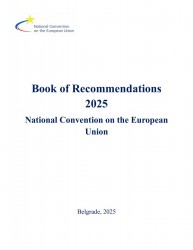 NCEU Book of Recommendations 2025
NCEU Book of Recommendations 2025
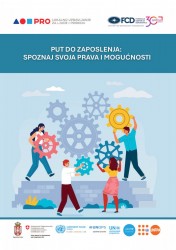 Manual “The Path to Employment: Get to Know Your Rights and Opportunities”
Manual “The Path to Employment: Get to Know Your Rights and Opportunities”
 Challenges for Organising and Collective Bargaining in Care, Administration and Waste collection sectors in Central Eastern European Countries
Challenges for Organising and Collective Bargaining in Care, Administration and Waste collection sectors in Central Eastern European Countries
 Public Policy Proposals – Collective Bargaining (CEECAW)
Public Policy Proposals – Collective Bargaining (CEECAW)
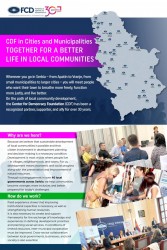 CDF in Cities and Municipalities: Together for a Better Life in Local Communities
CDF in Cities and Municipalities: Together for a Better Life in Local Communities
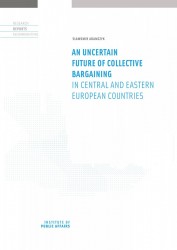 Comparative reports on collective bargaining - CEECAW
Comparative reports on collective bargaining - CEECAW
 POLITEIA – Regional School for Youth Participation 2025 (leaflet)
POLITEIA – Regional School for Youth Participation 2025 (leaflet)
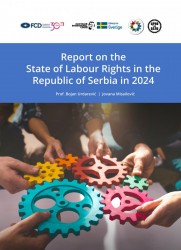 Report on the State of Labour Rights in the Republic of Serbia in 2024
Report on the State of Labour Rights in the Republic of Serbia in 2024
 Unlocking Collective Bargaining Power in Three Sectors: A Call to Action
Unlocking Collective Bargaining Power in Three Sectors: A Call to Action
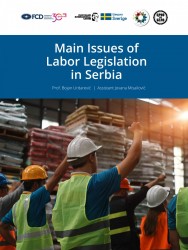 Main Issues of Labor Legislation in Serbia
Main Issues of Labor Legislation in Serbia
 New Monitoring Report by the “SDGs for All” Platform: Is the End Goal in Sight?
New Monitoring Report by the “SDGs for All” Platform: Is the End Goal in Sight?
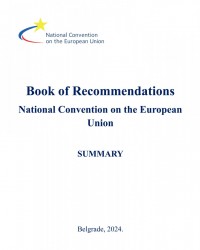 NCEU Book of Recommendations 2024 (Summary)
NCEU Book of Recommendations 2024 (Summary)
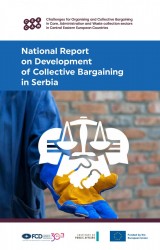 National reports on collective bargaining in Serbia - CEECAW
National reports on collective bargaining in Serbia - CEECAW
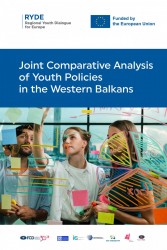 The Comparative Analysis of Youth Policies in the Western Balkans (WB)
The Comparative Analysis of Youth Policies in the Western Balkans (WB)
 Unlocking Collective Bargaining Power in Three Sectors: A Call to Action
Unlocking Collective Bargaining Power in Three Sectors: A Call to Action
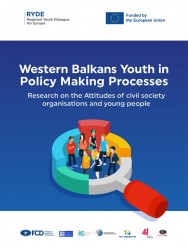 Western Balkans Youth in Policy Making Processes
Western Balkans Youth in Policy Making Processes
 SDGs for All Platform newsletter (December 2023)
SDGs for All Platform newsletter (December 2023)


